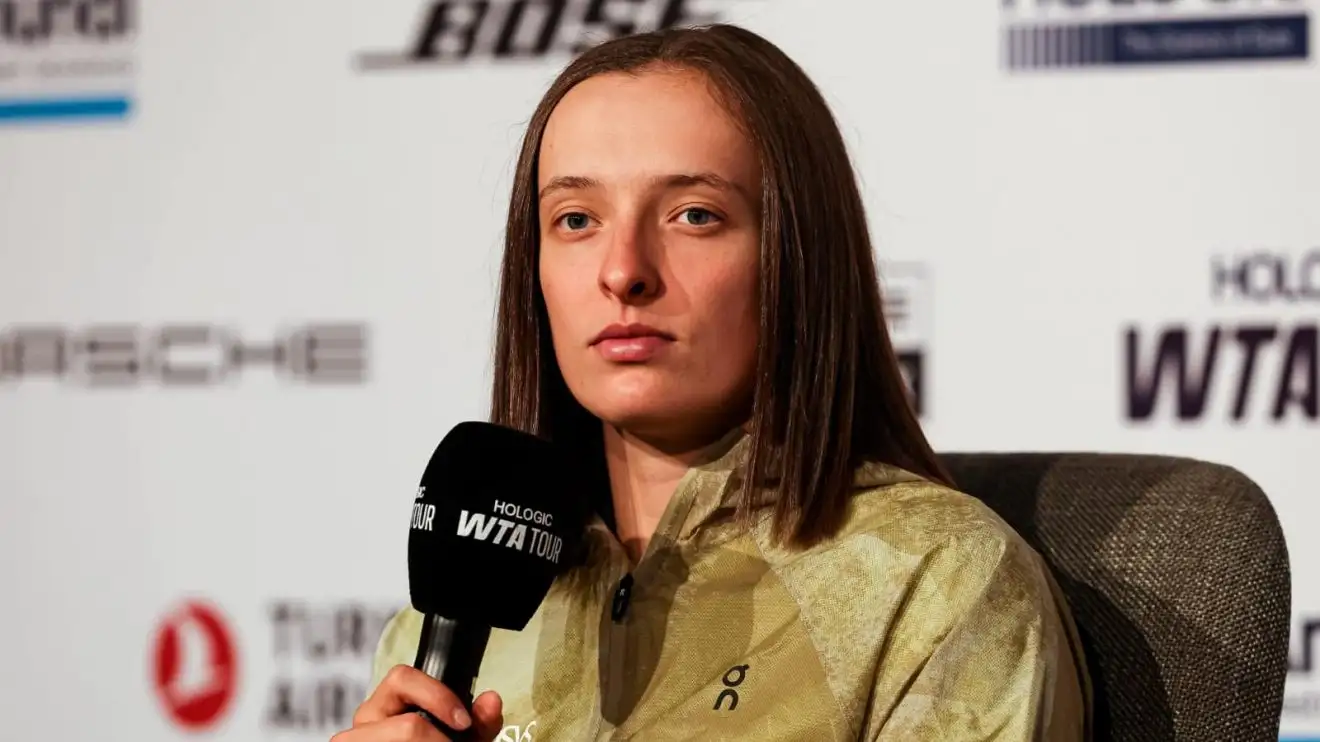
Iga Swiatek, the 23-year-old Polish tennis star and five-time Grand Slam champion, has never shied away from speaking her mind. As the former world No. 1 and a dominant force on the WTA Tour, her recent outspoken criticism of the WTA’s demanding schedule has reignited a fiery debate about player welfare in professional tennis. With a congested calendar that she claims is “forcing us to play more events,” Swiatek’s concerns, voiced during the 2024 Cincinnati Open and echoed throughout the season, highlight the physical and mental toll of a system that prioritizes revenue over rest. As she prepares for her second-round match against Alex Eala at the Madrid Open on April 27, 2025, Swiatek’s plea for change resonates with players and fans alike, raising questions about the sustainability of the sport’s relentless pace.
The WTA’s current rules require top players to compete in up to 21 tournaments annually, including the four Grand Slams, 10 WTA 1000 events, six WTA 500 tournaments, and the WTA Finals for those who qualify. This marks a significant increase from the 15 mandatory events prior to 2019, with several WTA 1000 tournaments now extended to two weeks, further compressing the calendar. Swiatek, who has played 15 events in 2024—including the Paris Olympics and Billie Jean King Cup qualifiers—has been vocal about the strain. “What can I say? I’ve been kind of an advocate in saying that we shouldn’t be pushing and pushing for us to play more,” she told reporters in Cincinnati. “Obviously it is not our decision, but for sure I think we have too many tournaments in the season. It makes tennis less fun for us. It’s not going to end well.” Her frustration peaked after a quarterfinal loss to Jessica Pegula at the 2024 US Open, where she noted, “We literally need to show up and we don’t have time to work on stuff or live peacefully, because from one tournament we’re going straight to another.”
Swiatek’s concerns are not isolated. The grueling schedule, particularly the Middle Eastern swing (Doha and Dubai) followed by the “Sunshine Double” (Indian Wells and Miami), leaves little room for recovery or technical refinement. “For sure it’s a calendar thing. Like, we’re not going to be able to be consistent for many years playing week by week,” she said after a 2025 Dubai loss to Mirra Andreeva, blaming the lack of practice time due to constant travel and surface changes. The WTA’s penalty system exacerbates the issue: skipping mandatory events without a valid excuse, such as injury, results in fines and “zero-pointers” that drag down rankings. Swiatek faced this in 2024, losing 120 points from her Miami Open performance for missing Beijing and Wuhan, citing personal matters, which cost her the No. 1 ranking to Aryna Sabalenka. Sabalenka, who played only four WTA 500 events, lost just 10 points, highlighting the system’s uneven impact.
The backlash to Swiatek’s comments has been mixed. Former world No. 1 Yevgeny Kafelnikov lashed out, stating, “Is someone pushing you to play??? All you fricking do is complain!! You deserve to get paid a lot less than you do now!!” Fans on X echoed this sentiment, with some calling her “entitled” for criticizing the schedule in February, early in the season. Others, however, rallied to her defense. Tennis journalist Bastien Fachan retorted, “She’s way more successful at 23 than you were in your entire career, sit this one out champ,” while a fan noted, “There’s this thing called mandatory tournaments, and unless you have an injury, you have to or there are penalties.” Swiatek herself acknowledged the business side of the sport, saying at the 2024 WTA Finals, “It would be easy to fix for people who are in charge, but they already made plenty of decisions and they promised so many things to tournaments.” Yet, she remains hopeful, noting improved communication with the WTA: “Now I think that they are listening to us much more.”
Swiatek’s 2024 season, with five titles including a third consecutive Roland Garros crown, underscores her resilience, but also her vulnerability. Upsets at the Australian Open (Linda Noskova), Wimbledon (Yulia Putintseva), and the US Open (Pegula), coupled with a one-month suspension for a contaminated sleep medication, tested her mettle. Her decision to skip the Asian swing to prioritize rest, followed by a group-stage exit at the WTA Finals, allowed her to compete in the Billie Jean King Cup Finals, where she boasts a 9-2 singles record. Looking ahead to 2025, Swiatek is confirmed for the United Cup and aims to reclaim her Qatar Open title, but her calendar remains packed with mandatory events. “We deserve to rest a little bit more,” she pleaded, a sentiment echoed by players like Mackie McDonald, who criticized the tours’ lack of unity.
As Swiatek battles on clay in Madrid, her advocacy for a less punishing schedule continues to gain traction. With a career win-loss record of 64–9 in 2024 and a legacy already rivaling tennis greats, she’s not just fighting for titles but for a healthier future for the sport. Whether the WTA will heed her call remains uncertain, but Swiatek’s voice—bold, unapologetic, and backed by her on-court dominance—is impossible to ignore.
Leave a Reply